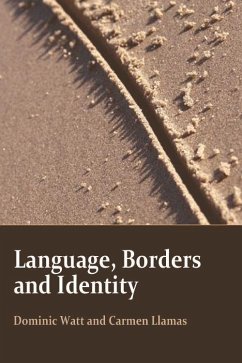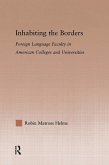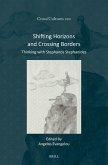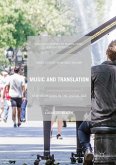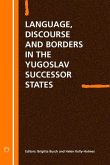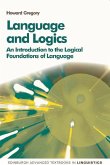Identifying and examining political, socio-psychological and symbolic borders, Language, Borders and Identity encompasses a broad, geographically diverse spectrum of border contexts, taking a multi-disciplinary approach by combining sociolinguistics research with human geography, anthropology and social psychology. The book illustrates a representative range of methodological approaches used by researchers in the field and examines regional and local borders alongside the political borders that divide monoglossic and heteroglossic territories. Using international case studies and examples throughout, this book also looks to symbolic borders, which are often encoded in the semiotic manipulation of the linguistic landscape. It further assesses the linguistic implications of the presence of borders in applied contexts, including language planning and policy (e.g. in multilingual education or for the protection of minority languages) and border control. By casting its net wide, Language, Borders and Identity develops and refines models of how language is used to construct borders, and to indicate on which side of border speakers situate themselves. This book brings into focus the dual reactive and proactive functions that language serves in this respect, exploring the tensions between essentialist and constructionist approaches to identity, and offers a valuable resource for advanced students and researchers in sociolinguistics and the sociology of language.
A wide-ranging and multi-disciplinary discussion of the connections between language, borders and identities. Drawing on a broad, geographically diverse spectrum of studies of language use and attitudes in a variety of border contexts, Language, Borders and Identity takes an integrative interdisciplinary approach by combining sociolinguistic research with insights and investigative techniques from human geography, anthropology and social psychology. The book illustrates a range of methodological approaches used by researchers in the field and examines socio-psychological and symbolic borders alongside the political borders that divide monoglossic and heteroglossic territories. Using international case studies and examples throughout, this book also looks to symbolic borders, which may be encoded via the semiotic manipulation of the linguistic landscape. It further assesses the linguistic implications of the presence of borders in applied contexts, including language planning and policy (e.g. in multilingual education or for the protection of minority languages) and the role of linguistic behaviour in the enforcement of border controls. Language, Borders and Identity develops and refines models of how language is used to construct borders, and how it serves to index how speakers place themselves with respect to these boundaries. Through exploration of the tensions between essentialist and constructionist approaches to identity, this book brings into focus the dual reactive and proactive functions that language fulfils in this respect, and offers a valuable resource for advanced students and researchers in sociolinguistics and the sociology of language. Dominic Watt is Senior Lecturer in Forensic Speech Science at the University of York, UK. Carmen Llamas is Senior Lecturer in Sociolinguistics at the University of York, UK.
Hinweis: Dieser Artikel kann nur an eine deutsche Lieferadresse ausgeliefert werden.
A wide-ranging and multi-disciplinary discussion of the connections between language, borders and identities. Drawing on a broad, geographically diverse spectrum of studies of language use and attitudes in a variety of border contexts, Language, Borders and Identity takes an integrative interdisciplinary approach by combining sociolinguistic research with insights and investigative techniques from human geography, anthropology and social psychology. The book illustrates a range of methodological approaches used by researchers in the field and examines socio-psychological and symbolic borders alongside the political borders that divide monoglossic and heteroglossic territories. Using international case studies and examples throughout, this book also looks to symbolic borders, which may be encoded via the semiotic manipulation of the linguistic landscape. It further assesses the linguistic implications of the presence of borders in applied contexts, including language planning and policy (e.g. in multilingual education or for the protection of minority languages) and the role of linguistic behaviour in the enforcement of border controls. Language, Borders and Identity develops and refines models of how language is used to construct borders, and how it serves to index how speakers place themselves with respect to these boundaries. Through exploration of the tensions between essentialist and constructionist approaches to identity, this book brings into focus the dual reactive and proactive functions that language fulfils in this respect, and offers a valuable resource for advanced students and researchers in sociolinguistics and the sociology of language. Dominic Watt is Senior Lecturer in Forensic Speech Science at the University of York, UK. Carmen Llamas is Senior Lecturer in Sociolinguistics at the University of York, UK.
Hinweis: Dieser Artikel kann nur an eine deutsche Lieferadresse ausgeliefert werden.

